2023 Dodge Durango SRT Hellcat Review and Test Drive
A Hellcat for the whole family.
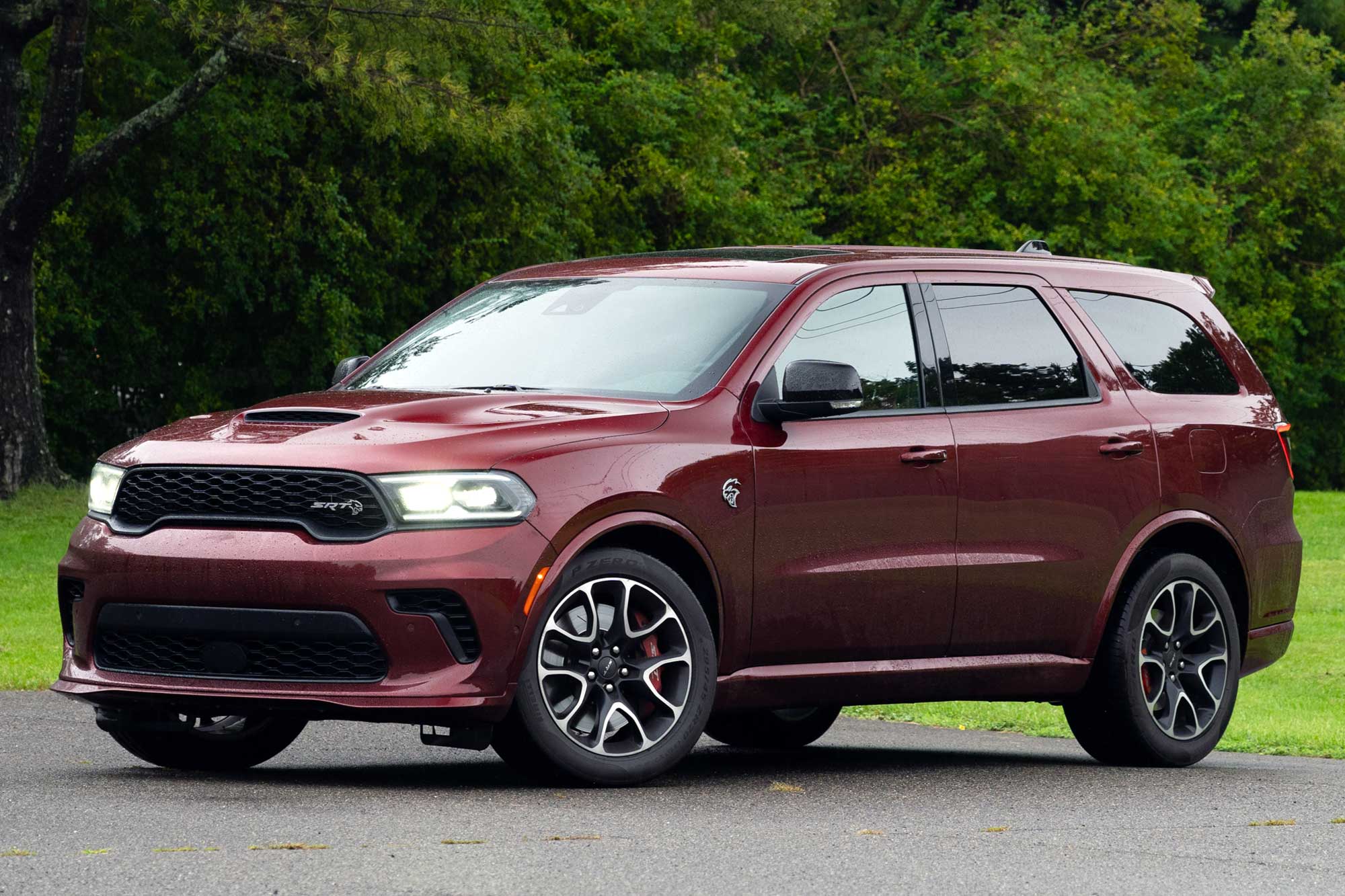 Tim Stevens
Tim Stevens
The name Hellcat implies something untenable, uncontrollable, or at the very least wildly uncouth and uncivilized. Trying to marry that with a three-row SUV, something that by its very definition must be good at hauling lots of people in reasonable comfort, is a tricky thing. Regardless, that unlikely mixture is exactly what we have here: the Dodge Durango SRT Hellcat.
And somehow, it works. Despite offering more than twice the power and torque of a base Durango SXT, despite requiring a pronounced hood to find clearance for the supercharger perched on top of the 6.2-liter Hemi V8, and despite that supercharger whining and screaming whenever you get on the gas, this Hellcat SUV manages to be simultaneously invigorating and comfortable. Its combination of audacity and practicality make it a worthwhile alternative to other high-performance SUVs such as the Porsche Cayenne Turbo and BMW X5 M Competition.
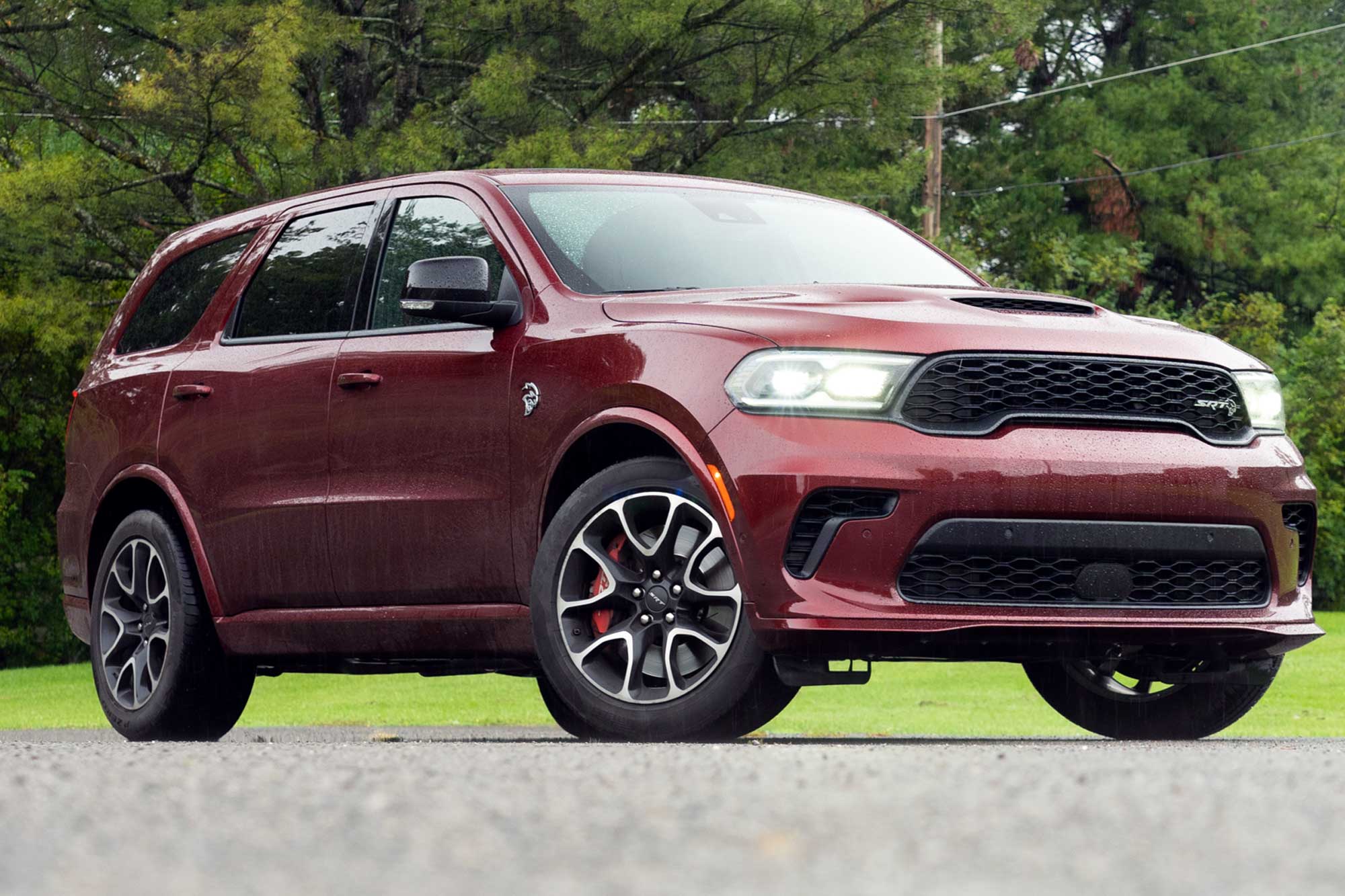 Tim Stevens
Tim Stevens
Durango SRT Hellcat Price Is High, But So Is the Performance Value
The Porsche and the BMW provide some high-power, high-dollar competition, next to which the Durango Hellcat looks like a bit of a bargain, though it is far from cheap. While you can get into a base Durango for around $40,000, the top-shelf SRT Hellcat starts at about $95,000 and comes in standard, Plus, and Premium trim levels.
For this Durango SRT Hellcat review, Dodge provided a Premium trim vehicle with a full tank of gas for one week. The SUV carried a manufacturer's suggested retail price of $104,670, including the $1,595 destination charge to ship it from the Detroit, Michigan, factory that builds it.
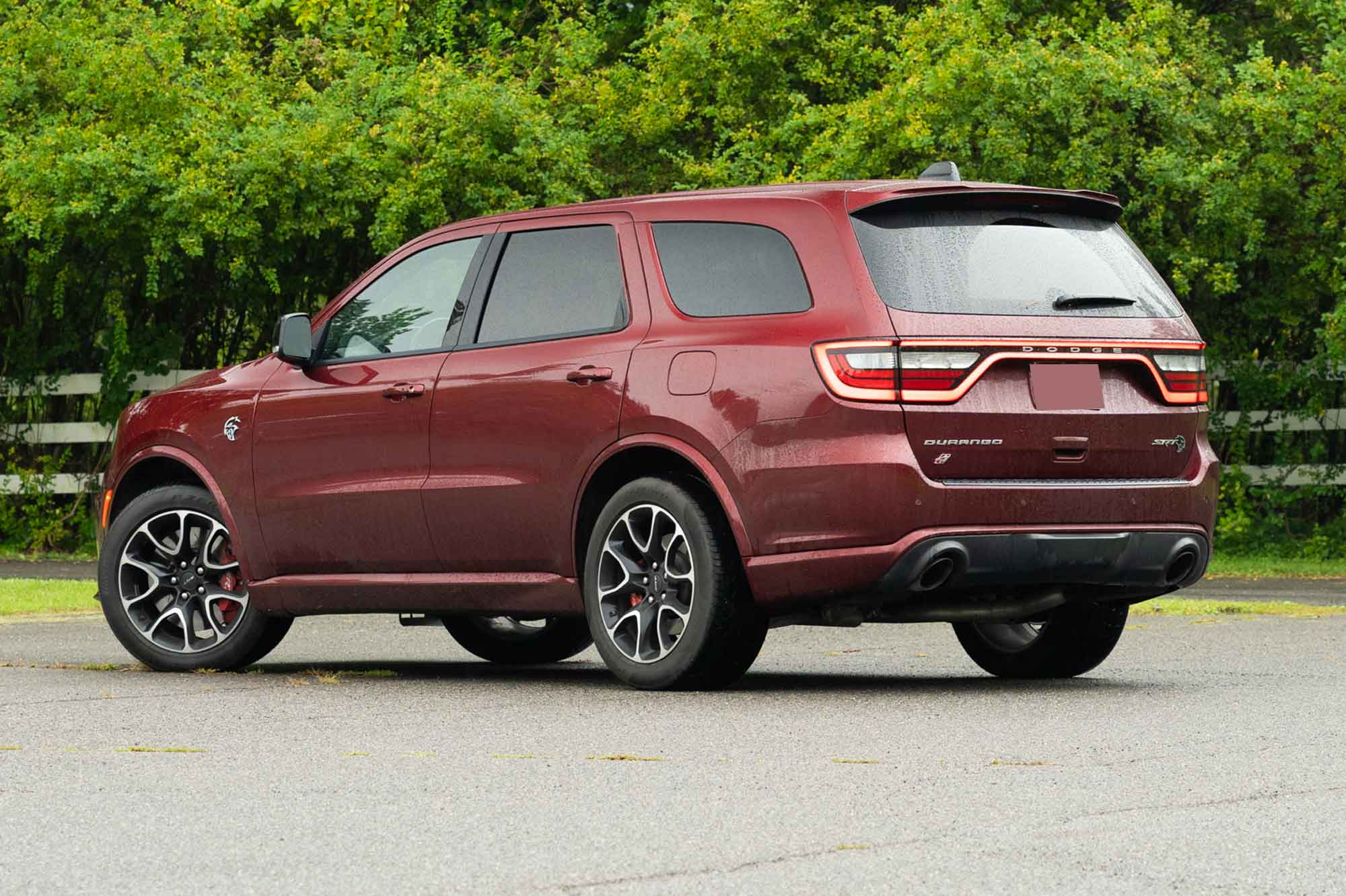 Tim Stevens
Tim Stevens
Screaming-Cat Logos Preview the Durango SRT Hellcat's Screaming Acceleration
There's no mistaking the Hellcat for a regular Durango on the outside. The screaming cat logos on the fenders and the gratuitous front and rear SRT badges make it clear.
In the front, a bulging hood with a pair of functional vents on either side is the most obvious visual difference between a Hellcat and a regular Durango. In back, the little spoiler on the top of the Hellcat's hatch gains a few extra flourishes on the trailing edge.
And then there are the obligatory big wheels, 20 inches here, with Pirelli P Zero 295/45ZR20 tires front and rear. These are rated as three-season tires, meaning you'll probably want to swap on something with more tread and a different compound if you live in a place that experiences winter precipitation.
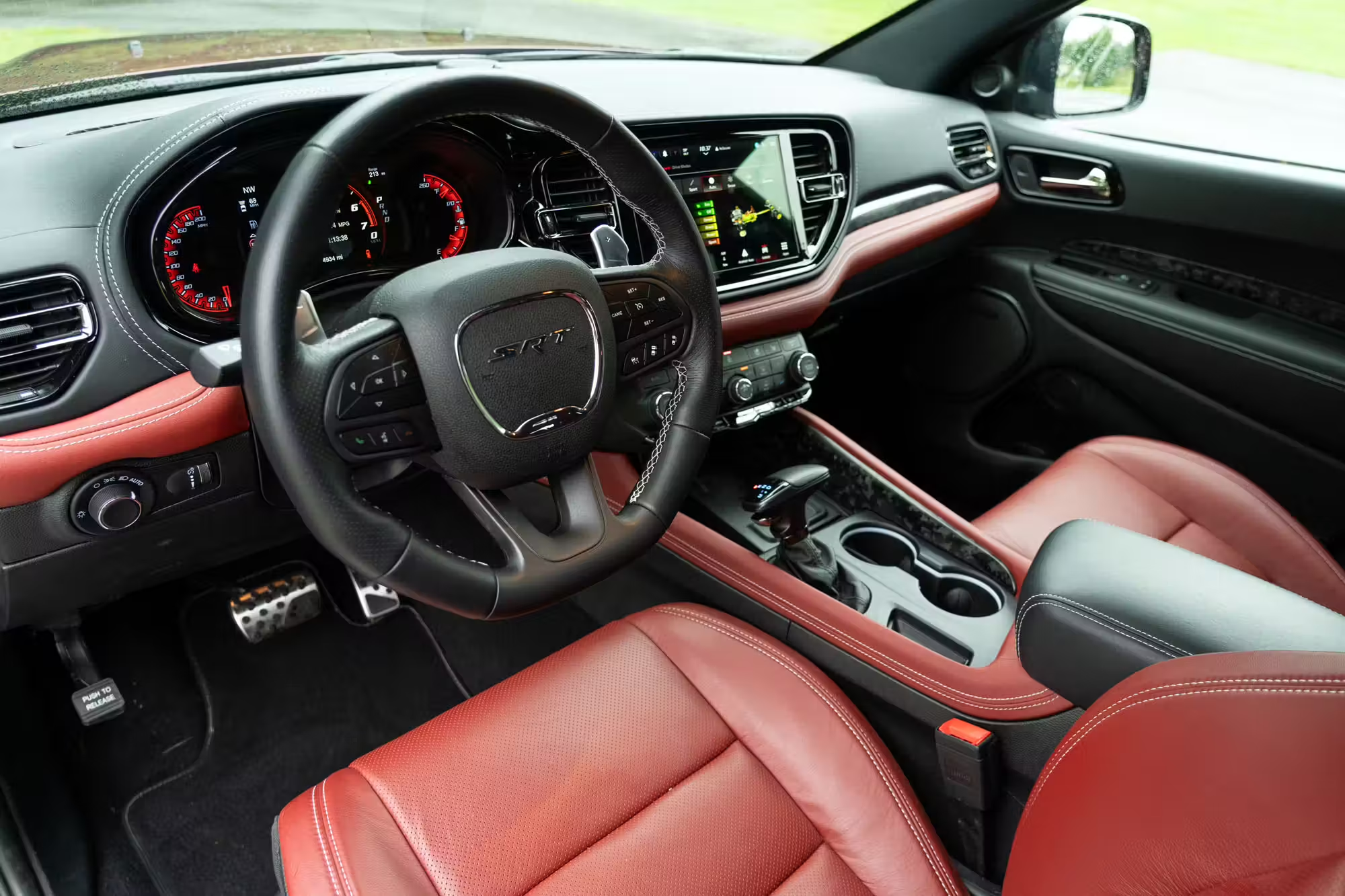 Tim Stevens
Tim Stevens
The Dodge Durango SRT Hellcat Interior Is Nicer Than Expected
The Hellcat flourishes are more prevalent on the inside, starting with generously sized SRT logos on the seats. The version I tested also featured forged carbon-fiber inserts on the doors and dashboard, a subtle but clear reference to this SUV's performance aspirations.
The crimson leather (Demonic Red per Dodge) is less subtle but works well given the Hellcat's character. That upholstery also adds some much-needed color to what would otherwise be an oppressively dark cabin. Everything else is black, from the carpeted floor mats to the spongy microfiber headliner.
Overall, the interior of the six-passenger Durango SRT Hellcat features good-quality materials. Only the lower portions of the door panels and transmission tunnel rely on harsh plastics.
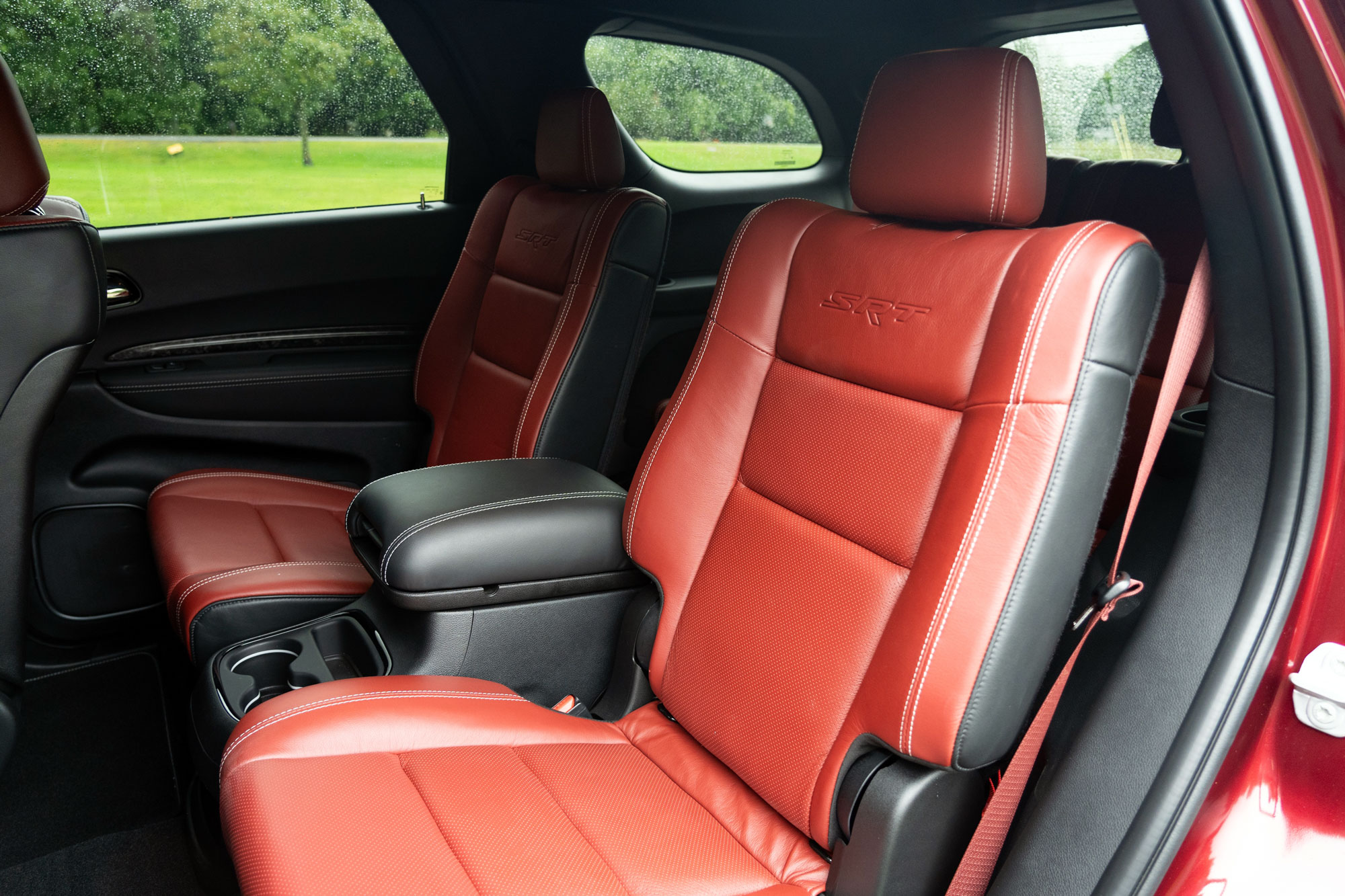 Tim Stevens
Tim Stevens
Three-Row Midsize SUV Comfort for up to Six People
The seat leather is plush and comfortable, even on the third-row bench, which is easy to access thanks to second-row seats that fold flat and then tilt forward. Adults sitting in the rearmost seat will find a surprising amount of legroom, though headroom is limited, and there's nothing in the way of creature comforts.
Those in the second-row chairs enjoy far nicer accommodations, not only in shoulder and headroom but also thanks to the seat heaters and the dedicated climate controls mounted on the ceiling. Dual USB-A ports will keep mobile devices charged, while a 110-volt outlet is there for anything needing more power.
The front seats, though, have the most room. They also have the most support, adding plenty of squeeze to keep occupants in place when driving with enthusiasm. But those bolsters are situated wide enough to fit a variety of builds. Up above is a sunroof of the non-panoramic variety with a manual shade.
The rest of the climate controls are available through a traditional panel on the dashboard, with dedicated buttons for seat heaters, ventilation, and defrost modes. You'll also find buttons for toggling drive modes and even a button set aside just to enable launch control, which goes a long way toward telegraphing the intent of this big SUV.
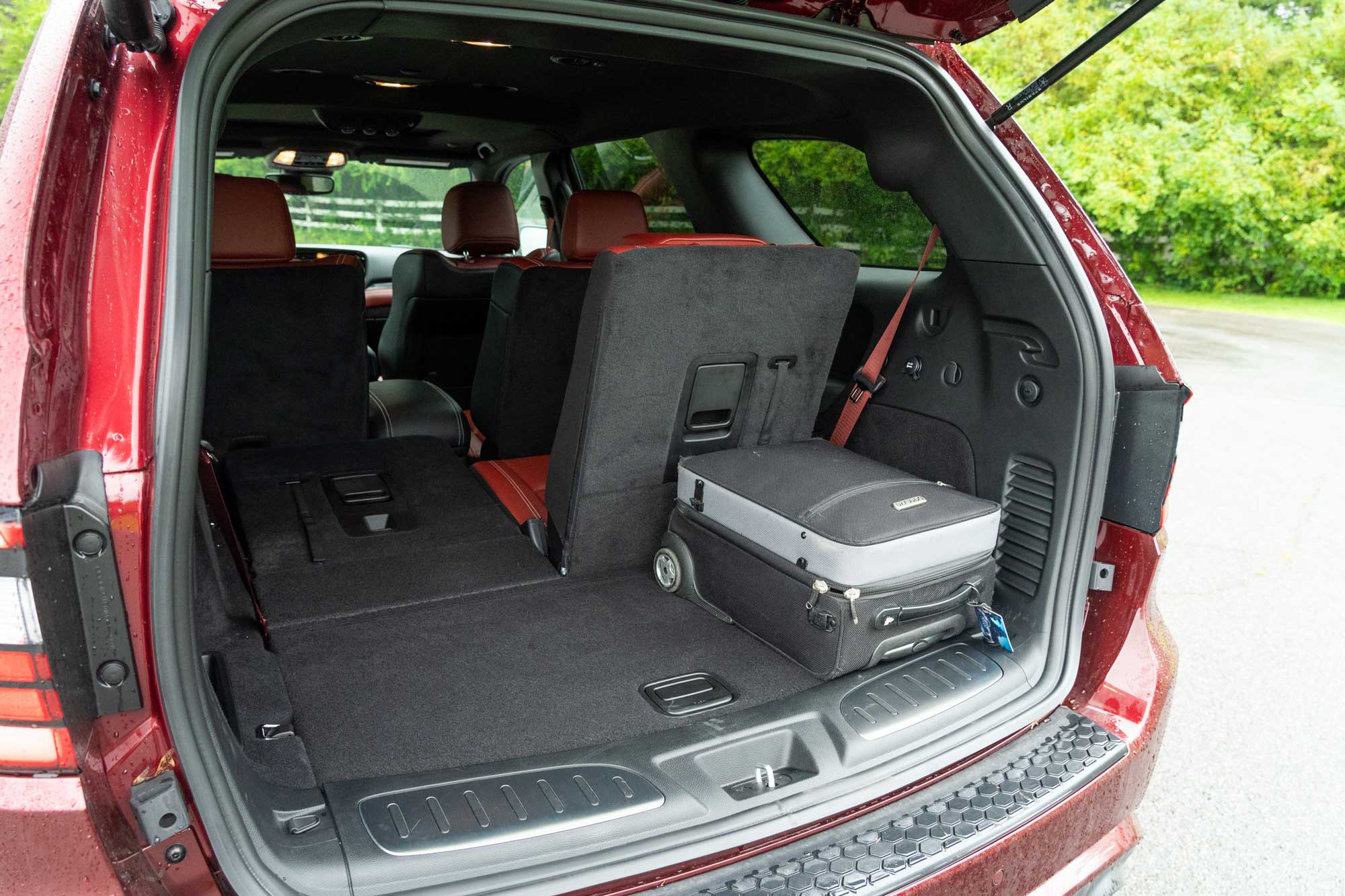 Tim Stevens
Tim Stevens
The Durango SRT Hellcat hauls cargo as well as other things, with capacity expanding from 17.2 cubic-feet behind the third-row seat to a maximum of 85.1 cu-ft of cargo space behind the front seats.
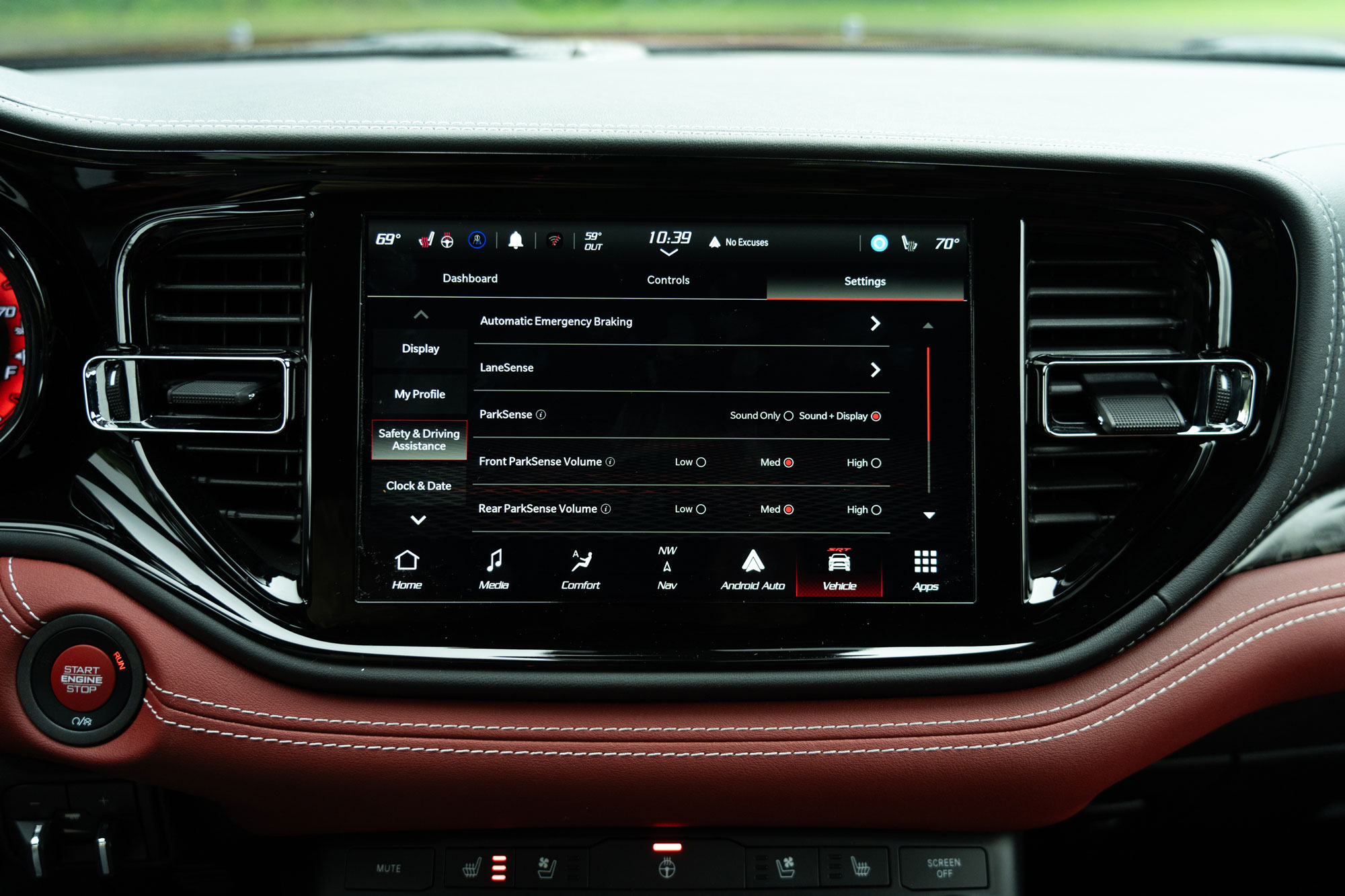 Tim Stevens
Tim Stevens
Dodge Durango Uconnect 5's Voice-Recognition Capabilities Aren't Perfect
The Durango SRT Hellcat runs Dodge's basic but functional UConnect 5 infotainment system on a 10.1-inch touchscreen. This system offers little in the way of flash but, more importantly, features good performance and wireless compatibility with Android Auto and Apple CarPlay. Pairing a phone for either of these platforms or just for use as a dedicated Bluetooth audio source is simple.
Uconnect 5's integrated voice-recognition system is quick to respond and reasonably comprehensive. It found my closest Starbucks on the first try and didn't miss a beat when I asked for tricky local town names like Schenectady. The voice assistant handles some more nuanced commands, like when I said I was cold, but didn't do so well on others, getting flummoxed when I said I was hungry, and when I said I needed to go to a hospital.
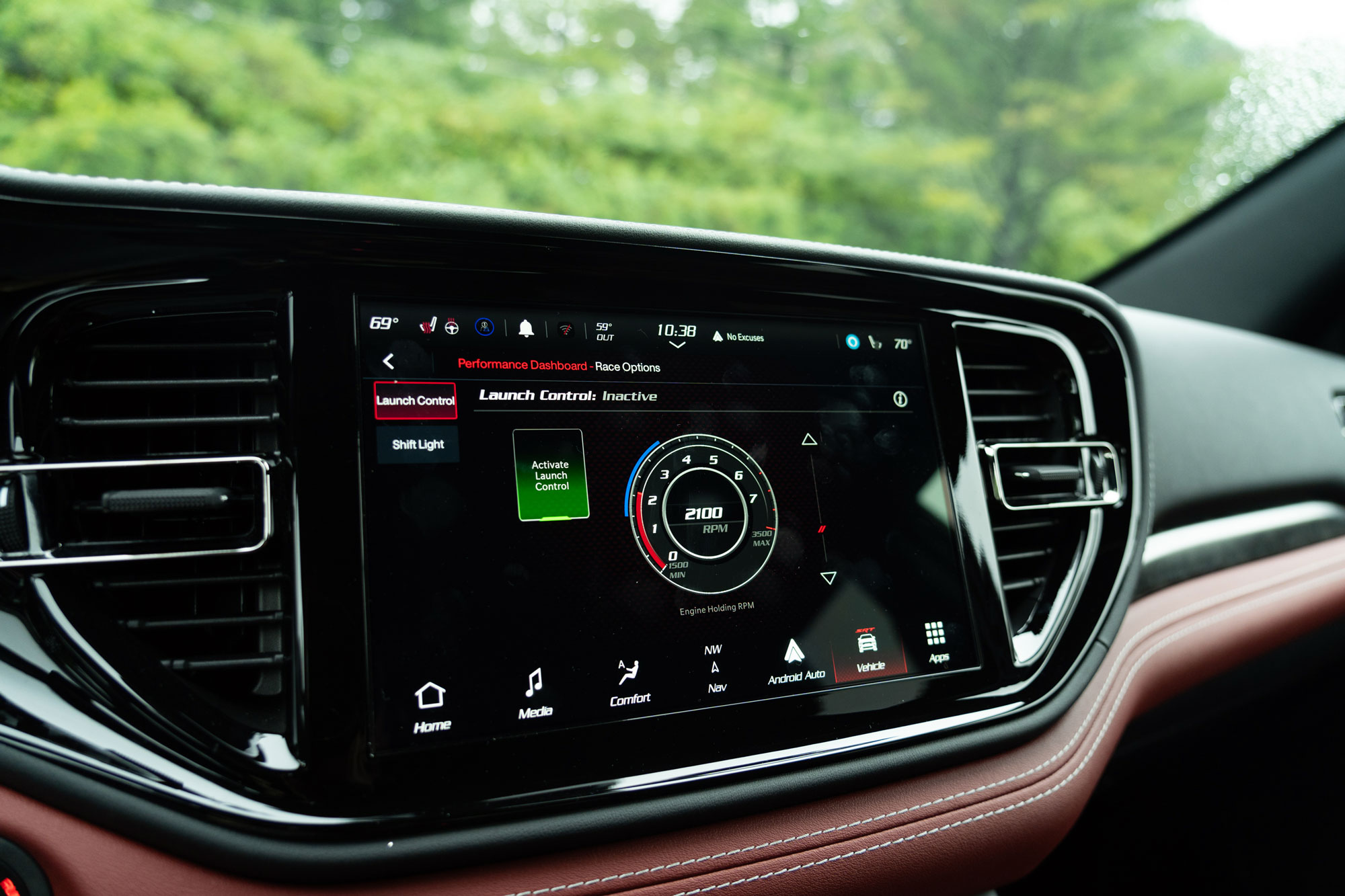 Tim Stevens
Tim Stevens
Program Your Performance Using SRT Performance Pages Tech
Dodge has expanded the graphical interface for the SRT Hellcat with numerous performance-related options, including a dedicated page to customize the launch-control system and a giant set of sliders and toggles to configure your custom drive mode exactly how you want it.
In front of the driver, traditional analog gauges present critical vehicle data, with water temperature and fuel on the right and a 200-mph speedometer on the left. Dodge optimistically scales the speedo to such a degree that it can be challenging to tell how fast you're going at road-legal speeds since the needle rarely swings farther to the right than the first third of its travel.
Thankfully, Dodge includes a digital driver-information display between the gauges, and it comes with a dedicated page featuring a big, bright speedometer, which you'll want to enable to maintain the legal speed limit when driving.
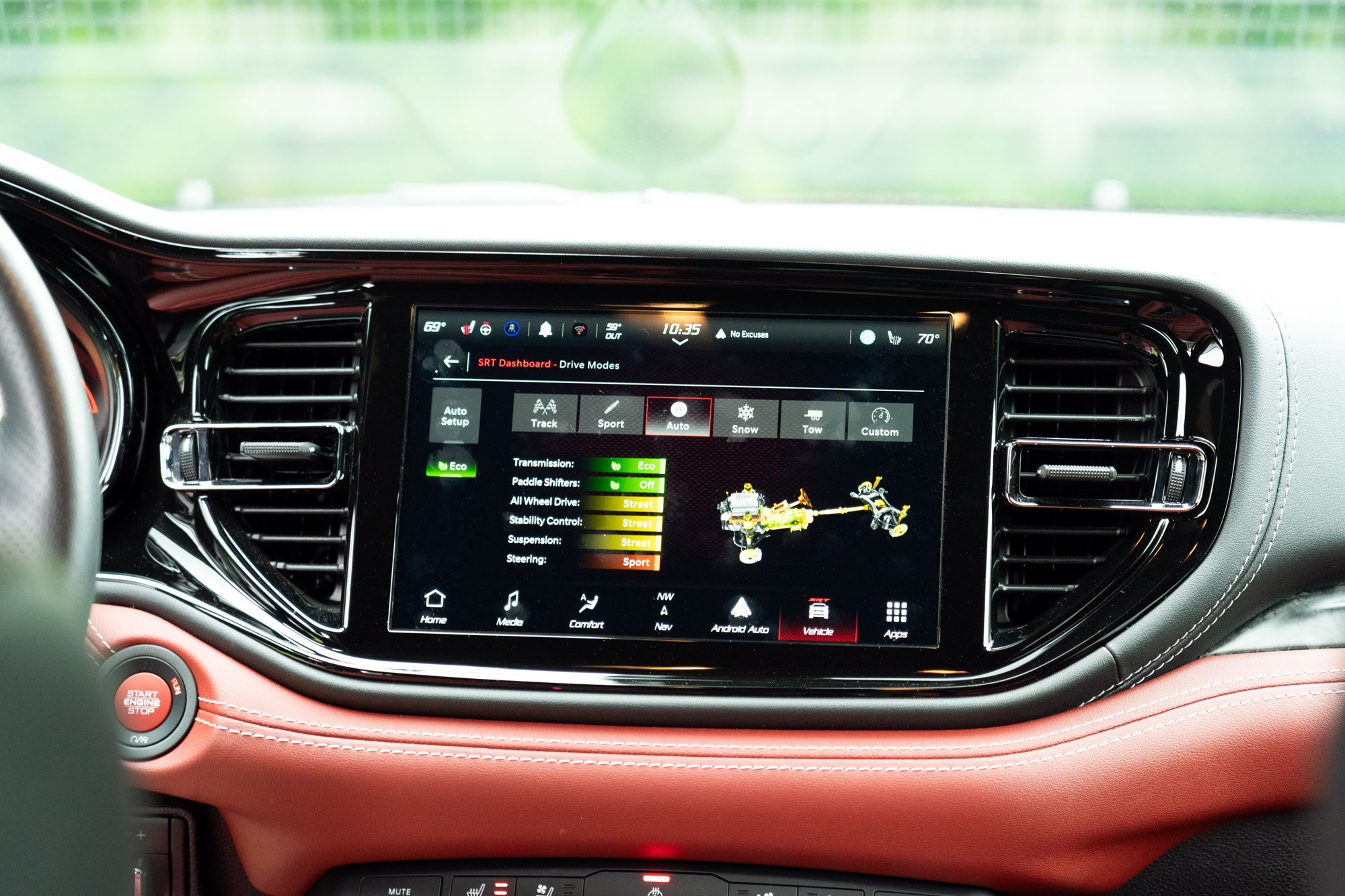 Tim Stevens
Tim Stevens
Dodge Durango Safety Features Lack Sophistication
Using the Uconnect 5 display, you can also modify the behavior of the SUV's integrated active safety systems, which are basic but functional. While the Durango has the features you expect as standard equipment, it lacks the more sophisticated driver assists you'll find on other, higher-end SUVs.
For example, while the adaptive cruise control works well when maintaining distances from vehicles ahead, the LaneSense technology is extremely simple, issuing lane-departure warnings and merely nudging the Durango back toward the middle of the lane should you allow it to stray. That is a far cry from an advanced lane-centering system that keeps a vehicle in the middle of the lane or a hands-off driver-assist system such as Ford BlueCruise or General Motors Super Cruise.
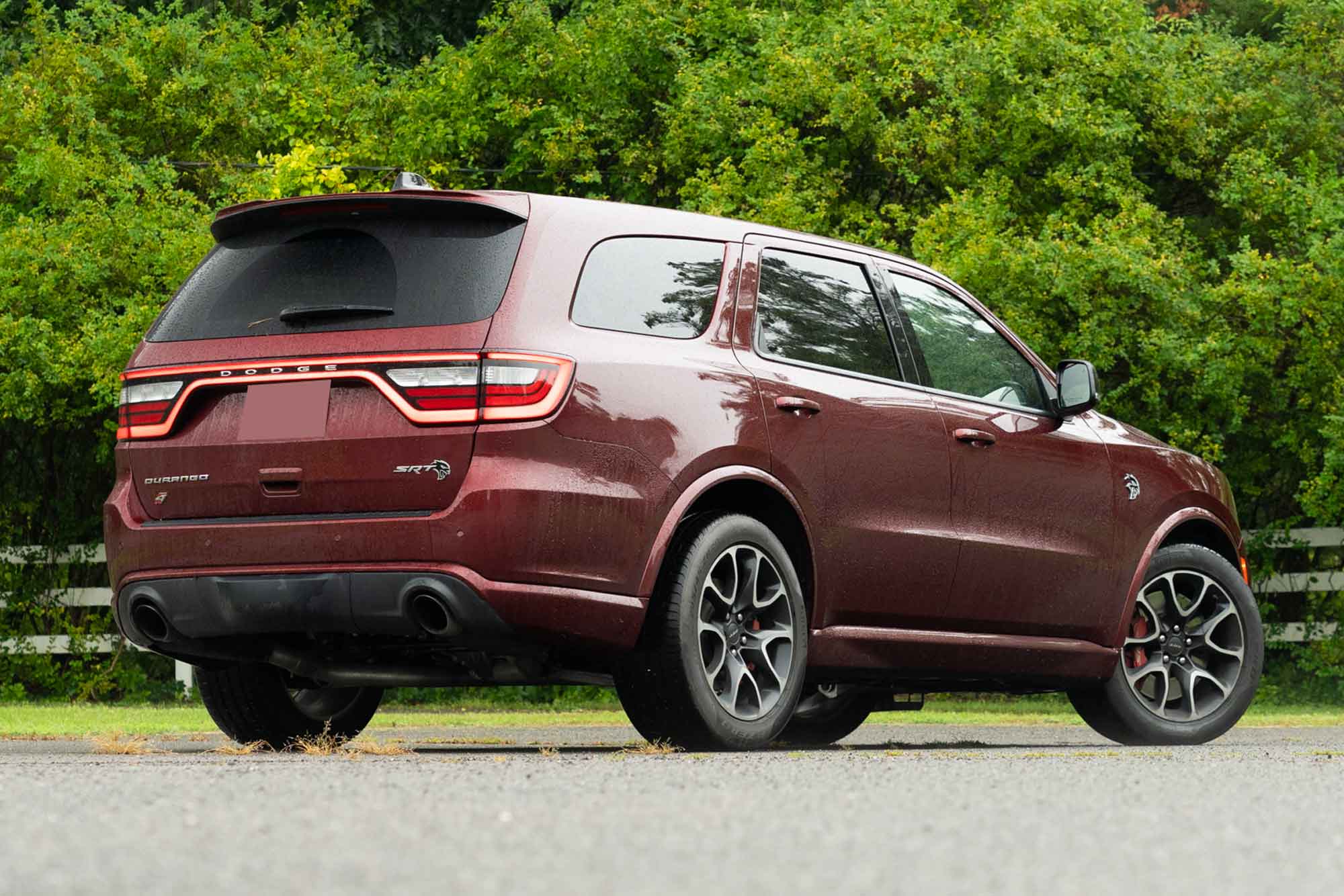 Tim Stevens
Tim Stevens
Dodge Durango Safety Ratings Indicate Room for Improvement
Regarding crash-test ratings, the National Highway Traffic Safety Administration gave the Durango a four-star overall safety rating. The SUV scored four stars in the frontal-impact tests, five stars for side-impact protection, and three stars for rollover resistance. You can
Testing by the Insurance Institute for Highway Safety (IIHS) is incomplete. The IIHS rated the Durango Marginal for driver-side protection in the small overlap front crash test and Good for side-impact protection and roof strength in a rollover accident. However, as of publication, the
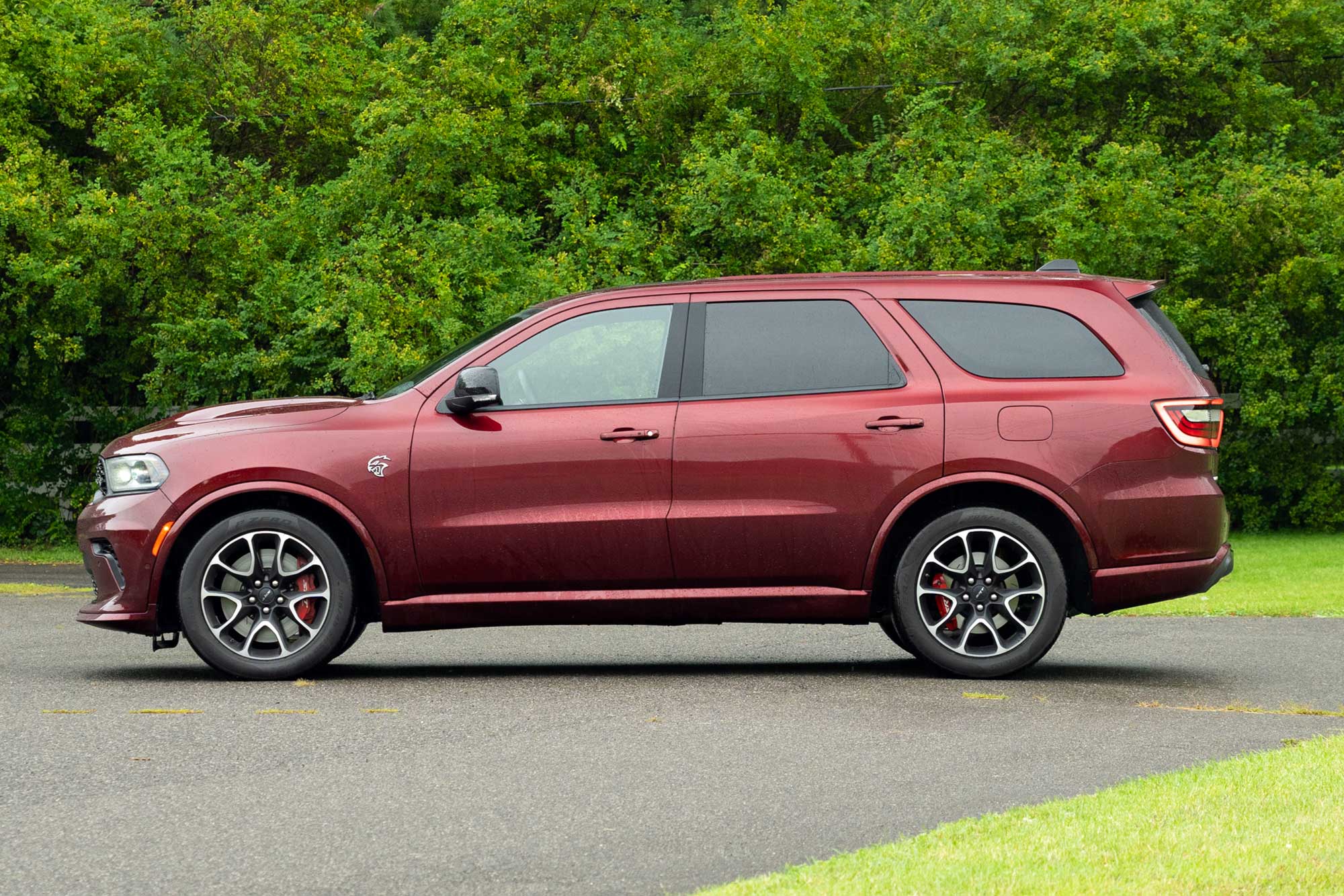 Tim Stevens
Tim Stevens
What it's like to drive the 2023 Dodge Durango SRT Hellcat
About two seconds after you prod the engine start/stop button, you know this isn't your average Durango. The SRT Hellcat fires up with a reluctant, booming groan, then settles into the slightly uneven, impossible-to-miss idle of Dodge's Hemi supercharged 6.2-liter V8.
When idling at 750 rpm, the engine has way more personality than most other SUVs do at full song. You will absolutely be a standout wherever you go.
The tone gets even brighter when you get on the gas and open it up a bit. The supercharger stacked on top of the engine lets out its characteristically off-kilter howl when the tachometer gets much past 3,000 rpm, a discordant but lovely harmony between the booming exhaust and the soprano supercharger.
More importantly, the Durango SRT Hellcat has the performance to match its personality. With 710 horsepower and 645 pound-feet of torque, this SUV will sprint to 60 in 3.5 seconds, according to Dodge. It's just a button press away whenever you want to try that out.
Tap the launch-control button just ahead of the shifter, step hard on the brake, and then on the accelerator. When you release the brake pedal, the Durango leaps forward with shocking speed.
Even accelerating out of mundane corners, the rear tends to step sideways a bit. But, in my experience, so long as you keep the stability and traction-control systems on, any wayward wags of the tail are easily kept in check.
With the suspension at its stiffest and everything made more aggressive, the Hellcat can be surprisingly fun to drive. It's smooth and easy to brake hard, engaging when diving into corners, and remarkably swift coming out of them.
Six driving modes are at your disposal: Auto, Tow, Snow, Sport, Track, and Custom. These modes change the transmission behavior, all-wheel-drive system, stability control, adaptive suspension, and steering feel. Impressively, you can fully customize each of these modes. If you're looking to save some money on gas, there's an additional Eco setting that you can apply, where the Durango will be a little more eager to upshift and keep the revs low.
That Tow mode, by the way, is there for more than just looks. The Durango SRT Hellcat can pull up to 8,700 pounds and has dedicated trailer-brake controls.
In Auto mode, the Durango SRT Hellcat can be a surprisingly pleasant cruiser. With the adaptive suspension at its softest setting, there's a tendency for this SUV to float, but less than in your average three-row SUV. It soaks up big bumps calmly and cleanly. There's a bit of exhaust drone on the highway, but it's a small price to pay for the performance on tap here.
The price at the pump might be more substantial. The Environmental Protection Agency rates the SRT Hellcat at 12/17/13 mpg city/highway/combined. On a 60-mile loop split with slightly more rural lanes than highway, I observed just 12 mpg, but that included a few moments of efficiency-killing acceleration.
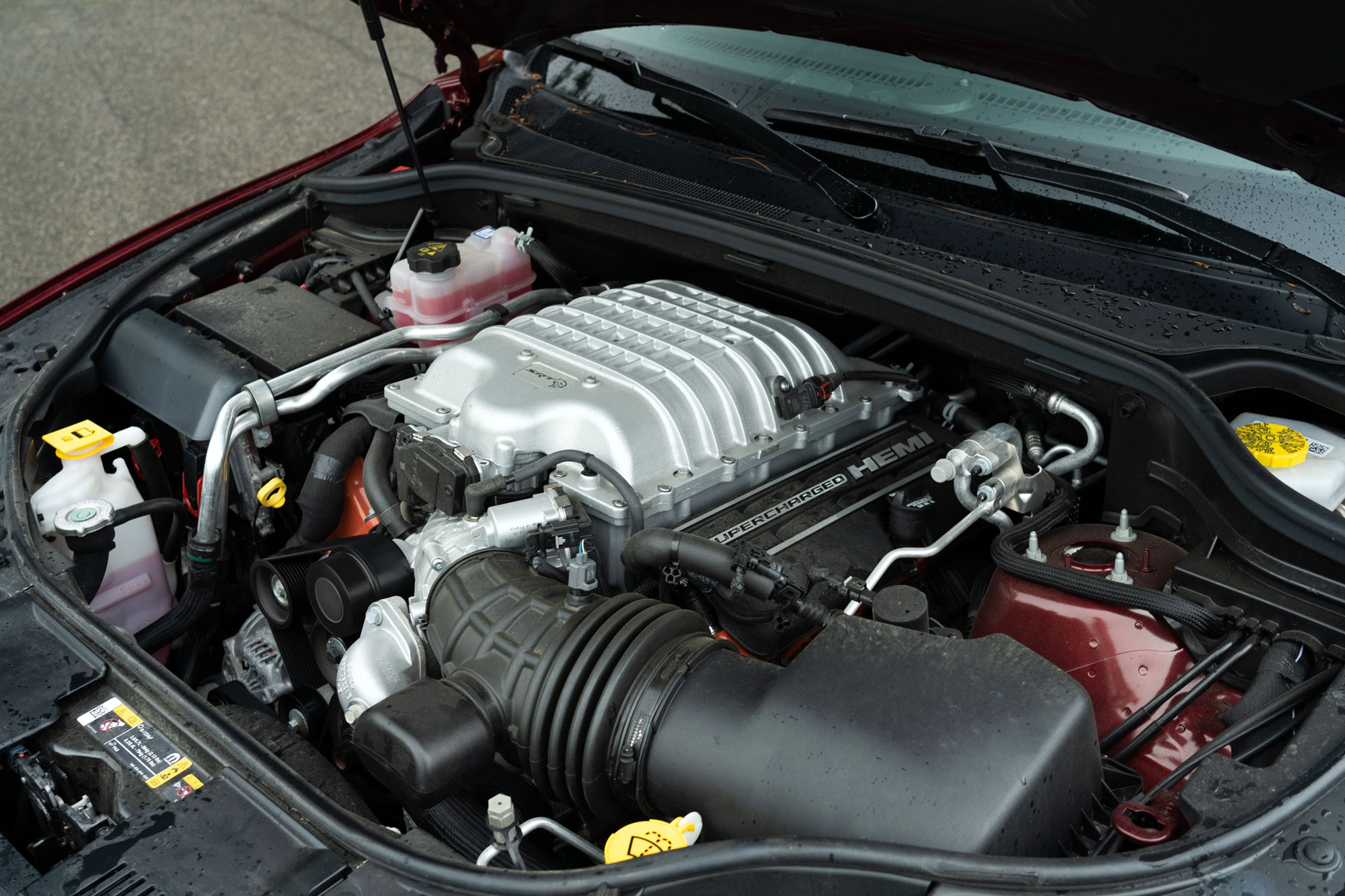 Tim Stevens
Tim Stevens
Durango SRT Hellcat Represents the Practical Side of Classic V8 Performance
The Dodge Durango SRT Hellcat is a paradox. On paper, it just looks like another pricey option, one more place to shove that Hellcat engine before Dodge jumps onto the electric vehicle bandwagon with both feet.
What matters more than the price is that the resulting package is genuinely good. The Durango is more fun to drive than just about any other three-row SUV, accelerates more quickly than the rest of the pack, and can still seat six comfortably.
On top of that, it's among the best-looking SUVs on the market, made even more so with the SRT touches. At nearly $105,000, and with that fuel consumption, it's certainly not a frugal choice. But if you have the budget and the penchant for something like this, the Durango can be the most practical way to get a little Hellcat in your life.
All vehicle pricing includes MSRP plus destination charges (set at the time of publication), and will be rounded to the nearest thousand.
Written by humans.
Edited by humans.
 Tim Stevens
Tim StevensTim Stevens is a veteran editor, analyst, and expert in the tech and automotive industries. He helmed a major website's automotive coverage for nine years and acted as its content chief. Prior to that, Tim served as the editorial lead at a tech-oriented site and even led a previous life as an enterprise software architect.
Related articles
View more related articles